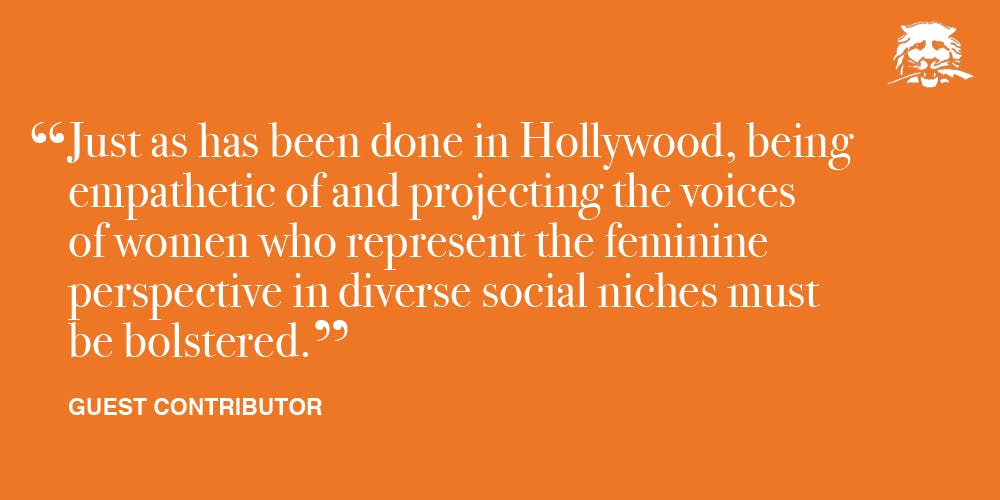We need more women like Cardi B. The first solo female rapper to top the Billboard 100 in 19 years, she has become a rare voice who is helping redefine #MeToo in entertainment sectors like hip-hop and the adult entertainment business. In those industries, the perception of gender power imbalance is inflated, which has been found to increase the likelihood of sexual assault by those in power. Cardi B is a rare representative for women in those industries who view themselves as taking control of their sexuality, although society may deem their occupations powerless. To shift the dominating perception of women having less power in those industries, we need more women like Cardi.
In cases where women’s experiences are not given the gravitas they deserve, a perception of gender power imbalance is often observed. For example, entertainment industries like Hollywood have been historically male-dominated. However, the recent surge of feminist movements in Hollywood and the #MeToo movement have empowered women in the industry. The long list of men who have been accused of sexual misconduct in Hollywood since last October is a testament of what can happen when women are empowered to voice their experiences.
The occurrences in Hollywood corroborate the finding of a 1994 study, which found that the perception of power asymmetries predicts the likelihood of sexual harassment. As women have begun to feel empowered through movements like #MeToo, victims have begun to voice their experiences of sexual harassment. Other men and women became allies in what became a movement that ultimately shifted the perception of gender imbalance in the industry. So one of the most effective methods in changing the perception of power imbalance in Hollywood has been through the projection of women’s voices in the business.
While the entertainment industry has made incredible progress, other sectors of the entertainment industry that are considered to sexualize women more, such as the hip-hop industry or the adult entertainment industry, have yet to make a breakthrough.
Like Hollywood, the hip-hop and adult entertainment industries have been historically plagued with gender imbalance and the disregard of sexual misconduct towards women. Those industries also have an exacerbated image of objectifying women and perpetuating male dominance. An issue arises when people think of women who are in the hip-hop or adult entertainment industries as willingly placing themselves in a realm of gender power imbalance and sexual objectification. Women in the adult entertainment industry have been portrayed as instruments of male enjoyment and have been deprived of power in the media. This perpetuates the myth that “women who get assaulted ask for it.”
The lessons learned from the empowerment of women’s voices in Hollywood should be applied to debunk the perception of power imbalance in other industries where women are still marginalized. Fortunately, women in the hip-hop and adult entertainment industries have found representation in Cardi B, who openly speaks about her experiences as a stripper and a female rapper in an industry that is still perceived to be male-dominated.
In a recent interview with Cosmopolitan, Cardi B pointed out the duality of the #MeToo movement in industries where sexuality is commercially emphasized and a historically gendered power imbalance exists. She stated that the validity of a woman’s statement is devalued if she participates in these industries because there is a societal perception that she is voluntarily exploiting herself in a male-dominated system. In her music, Cardi explains that women who work in these industries do not think they are serving men, but are rather expressing autonomy and ownership over their bodies and their sexuality. To Cardi, women in those industries are revolutionizing feminism by exercising their autonomy and often acquiring a degree of economic independence. She recalls her initial reason to start stripping was to get out of an abusive relationship. In her interview, she emphasizes that the women dancing at a strip club are human beings, and often recalls that when she used to be a stripper, she used to feel powerful, rather than subordinate to men.
Just as has been done in Hollywood, being empathetic of and projecting the voices of women who represent the feminine perspective in diverse social niches must be bolstered. Their experiences are instrumental to furthering gender equality by validating their experiences and reducing crimes that arise from perceptions of imbalance.
Women like Cardi B are offering much-needed insight into the roles of women in the hip-hop and adult entertainment businesses. However, Cardi B is one of the few representatives of women in those industries, and women’s experiences in those spheres are still stigmatized. Without more women like Cardi B, the feminine perspective is not emphasized as much as it should be and the perception of gender imbalance and its effects risks perpetuation.
Patricia Hoyos is a senior from Fairview, N.J. She can be reached at phoyos@princeton.edu.









